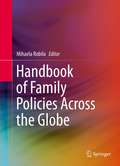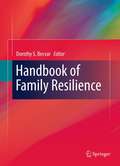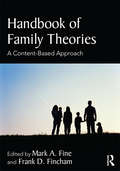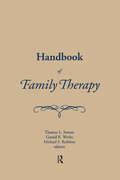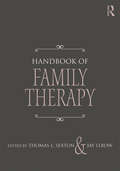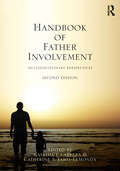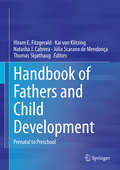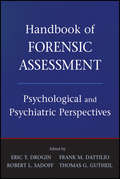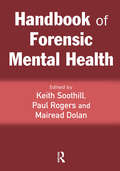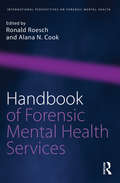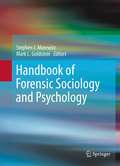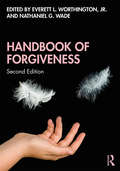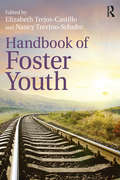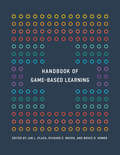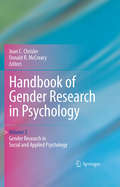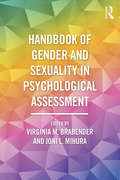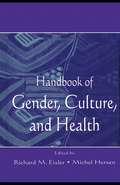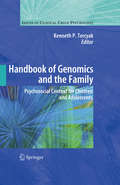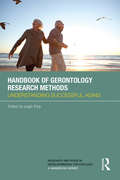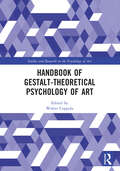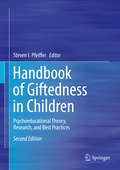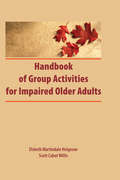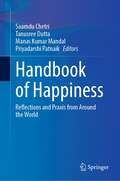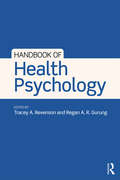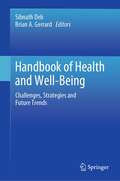- Table View
- List View
Handbook of Family Policies Across the Globe
by Mihaela RobilaFamily Policies Across the Globe provides comprehensive coverage of explicit and implicit family policies from an international perspective. The coverage includes issues such as family-friendly work practices, work-life balance, childcare, poverty, domestic violence, social exclusion/inclusion, immigration, and disability. The chapters explore what types of family policies exist in different countries or geographical areas, what are some of challenges encountered in developing, implementing, and evaluating them, and provides recommendations for an evidence-based policy making process.
Handbook of Family Resilience
by Dorothy S. BecvarResilience is a topic that is currently receiving increased attention. In general, resilience refers to the capacity of those who, even under the most stressful circumstances, are able to cope, to rebound, and to go on and thrive. Resilient families are able to regain their balance following crises that arise as a function of either nature or nurture, and to continue to encourage and support their members as they deal with the necessary requirements for accommodation, adaptation and, ultimately, healthy survival. Handbook of Family Resilience provides a broad body of knowledge regarding the traits and patterns found to characterize resilient individuals and well-functioning families, including those with diverse structures, various ethnic backgrounds and a variety of non-traditional forms. This Handbook brings together a variety of perspectives aimed at understanding and helping to facilitate resilience in families relative to a full range of challenges.
Handbook of Family Theories: A Content-Based Approach
by Frank D. Fincham Mark A. FineOrganized by content areas rather than by theory, this comprehensive, accessible handbook helps readers gain greater insight into how key theories have impacted today’s family research. Most competing books, organized by theory, do not provide a strong sense of the links between theory and research. Using the 2000 and 2010 decade-in-review issues of the Journal of Marriage and Family as a resource, the book addresses the most important topics impacting family studies research today. The introductory chapter, written by the editors, provides an overview of the role family theories have had on the field. This chapter is followed by 23 others on family-related content areas written by renowned scholars in the field. The book is organized around the most important domains in the field: parenting and parent-child relationships, romantic relationships, conflict and aggression, structural variation and transitions, demographic variations, and families and extra-familial institutions. Each of the contributors describes how theory has been used to generate new knowledge in the field and suggests future directions for how theory may be used to extend our knowledge base. The book helps readers acquire a working knowledge of the key family science theories, findings, and issues and understand how researchers make use of these theories in their empirical efforts. To maximize accessibility, each of the renowned contributors addresses a common set of issues in their chapter:• Introduction to the content area • Review of the key topics, issues, and findings• A description of each of the major theories used to study that particular content area • Limitations of the theories • Suggestions for better use of the theories and/or new theoretical advances • Conclusions about future theoretical developments. An ideal text for graduate and/or advanced undergraduate family theories courses, this book’s unique organization also lends itself to use in content-based family studies/science courses taught in family studies, human development, psychology, sociology, communication, education, and nursing. Due to its comprehensive and current approach, the book also appeals to scholars and researchers in these areas.
Handbook of Family Therapy: The Science and Practice of Working with Families and Couples
by Gerald Weeks Mike Robbins Tom SextonThis new Handbook of Family Therapy is the culmination of a decade of achievements within the field of family and couples therapy, emerging from and celebrating the dynamic evolution of marriage and family theory, practice, and research. The editors have unified the efforts of the profession's major players in bringing the most up-to-date and innovative information to the forefront of both educational and practice settings. They review the major theoretical approaches and break new ground by identifying and describing the current era of evidence-based models and contemporary areas of application. The Handbook of Family Therapy is a comprehensive, progressive, and skillful presentation of the science and practice of family and couples therapy, and a valuable resource for practitioners and students alike.
Handbook of Family Therapy: The Science and Practice of Working with Families and Couples
by Jay Lebow Thomas L. SextonIntegrative, research-based, multisystemic: these words reflect not only the state of family therapy, but the nature of this comprehensive handbook as well. The contributors, all well-recognized names who have contributed extensively to the field, accept and embrace the tensions that emerge when integrating theoretical perspectives and science in clinical settings to document the current evolution of couples and family therapy, practice, and research. Each individual chapter contribution is organized around a central theme: that the integration of theory, clinical wisdom, and practical and meaningful research produce the best understanding of couple and family relationships, and the best treatment options. The handbook contains five parts:• Part I describes the history of the field and its current core theoretical constructs• Part II analyzes the theories that form the foundation of couple and family therapy, chosen because they best represent the broad range of schools of practice in the field• Part III provides the best examples of approaches that illustrate how clinical models can be theoretically integrative, evidence-based, and clinically responsive• Part IV summarizes evidence and provides useful findings relevant for research and practice • Part V looks at the application of couple and family interventions that are based on emerging clinical needs, such as divorce and working in medical settings.Handbook of Family Therapy illuminates the threads that are common to family therapies and gives voice to the range of perspectives that are possible. Practitioners, researchers, and students need to have this handbook on their shelves, both to help look back on our past and to usher in the next evolution in family therapy.
Handbook of Father Involvement: Multidisciplinary Perspectives, Second Edition
by Catherine S. Tamis-LeMonda Natasha J. CabreraThis second edition reviews the new research findings and theoretical advances on fathers, families, child development, programs, and policies that have occurred in the past decade. Contributors from a range of disciplines and countries showcase contemporary findings within a new common chapter structure. All of the chapters are either extensively revised or entirely new. Biological, evolutionary, demographic, developmental, cultural, sociological, economic, and legal perspectives of father involvement are described along with policy and program implications. Now with a greater international perspective, this edition considers demographic shifts in families in the United States and Europe. All chapters now follow a common structure to enhance readability and interdisciplinary connections. Each chapter features: Historical Overview and Theoretical Perspectives; Research Questions; Research Methods and Measurement; Empirical Findings; Bridges to other Disciplines; Policy Implications; and Future Directions. In addition, each chapter highlights universal and cultural processes and mechanisms. This structure illuminates the ways that theories, methods, and findings are guided by disciplinary lenses and encourages multidisciplinary perspectives. This extensively revised edition now features: • Expanded section on Biological and Evolutionary Perspectives that reviews fathering in animal populations and the genetic and hormonal underpinnings that feed into fathering behaviors within and across species. • New section on Economic and Legal Perspectives that addresses the economics of fatherhood, marriage, divorce, and child custody issues, and family dispute resolution. • New section on Child Development and Family Processes that covers topics on father-child relationships, the father’ role in children’s language, cognitive, and social development, and father risk, family context, and co-parenting. • Separate chapters on Black, Latino, and Asian American fathers. • Now includes research on cohabitation and parenting, gender roles and fathering, intergenerational parenting, and fatherhood implications for men in the section on Sociological Perspectives. • The latest demographics, policies, and programs influencing father involvement in both the US and Europe. • Coverage of methodological and measurement topics and processes that are universal across ethnic groups and cultures in each chapter. Intended for advanced students, practitioners, policymakers, and researchers interested in fatherhood and family processes from a variety of disciplines including psychology, family studies, economics, sociology, and social work, and anyone interested in child and family policy.
Handbook of Fathers and Child Development: Prenatal to Preschool
by Natasha J. Cabrera Hiram E. Fitzgerald Kai Von Klitzing Júlia Scarano de Mendonça Thomas SkjøthaugThis handbook provides a comprehensive review of the impact of fathers on child development from prenatal years to age five. It examines the effects of the father-child relationship on the child’s neurobiological development; hormonal, emotional and behavioral regulatory systems; and on the systemic embodiment of experiences into the child’s mental models of self, others, and self-other relationships. The volume reflects two perspectives guiding research with fathers: Identifying positive and negative factors that influence early childhood development, specifying child outcomes, and emphasizing cultural diversity in father involvement; and examining multifaceted, specific approaches to guide father research. Key topics addressed include: Direct assessment of father parenting (rather than through maternal reports).The effects of father presence (in contrast to father absence).The full diversity of father involvement.Father’s impact on gender role differentiation.Father’s role in triadic interactions of family dynamics.Father involvement in psychotherapeutic family interventions. This handbook draws from converging perspectives about the role of fathers in very early child development, summarizes what is known, and, within each chapter, draws attention to the critical questions that need to be answered in coming decades.The Handbook of Fathers and Child Development is a must-have resource for researchers, graduate students, and clinicians, therapists, and other professionals in infancy and early child development, social work, public health, developmental and clinical child psychology, pediatrics, family studies, neuroscience, juvenile justice, child and adolescent psychiatry, school and educational psychology, anthropology, sociology, and all interrelated disciplines.
Handbook of Forensic Assessment
by Thomas G. Gutheil Eric Y. Drogin Frank M. Dattilio Robert L. SadoffThe first handbook to explore forensic assessment from psychiatric and psychological perspectives "The editors have assembled a magnificent collaboration between psychiatrists and psychologists to bring forth critical knowledge and insight to the core competency of forensic assessment. This handbook is essential reading and a comprehensive resource for both newly minted and seasoned forensic practitioners. " -Robert I. Simon, MD, Director, Program in Psychiatry and Law, Georgetown University School of Medicine "This long-awaited resource blows the dust off traditional standards, shakes the cobwebs out of our old ways of thinking, and shows the practical steps in producing work that will make sense to juries and withstand the most skillful cross-examination. . . . [T]here is no better resource. " -Kenneth S. Pope, PhD, ABPP, Diplomate in Clinical Psychology; coauthor, Ethics in Psychotherapy and Counseling, Fourth Edition "From preparation to collection to interpretation to communication of the results, this excellent, comprehensive treasure shows how to conduct forensic assessments. Each splendid evidence-based chapter is presented from the collaboration between psychologists and psychiatrists. It is a must-have resource for forensic experts as well as general practitioners or anyone wishing to understand standard of care in forensic assessment. " -Melba Vasquez, PhD, ABPP, 2011 American Psychological Association President The practitioner-oriented coverage in the Handbook of Forensic Assessment examines: The current state of psychology and psychiatry-including requisite clinical competencies, ethical guidelines, and considerations of multidisciplinary collaboration Various approaches to assessments in criminal and civil matters The principles of effective preparation, data collection, and interpretation, as well as communication for each special situation Topics including competence to stand trial, sexual offender evaluations, addictions, child abuse, and education Overarching practice issues, such as practice development, retention, compensation, consultation, and forensic treatment Includes sample reports that demonstrate the integrative potential of both psychology and psychiatry Incorporating a wealth of current and multidisciplinary research, the Handbook of Forensic Assessment is destined to become every mental health professional's most valuable one-stop reference for their forensic work.
Handbook of Forensic Mental Health
by Paul Rogers Keith Soothill Mairead DolanThis is a comprehensive reference book on the subject of forensic mental health, looking at what forensic mental health is and its assessment, management and treatment. It focuses on key topics and the issues underpinning them in contemporary society. The book includes: an account of the historical development of forensic mental health, along with a description of the three mental health systems operating in the UK an in-depth analysis of the forensic mental health process and system, including an analysis of the different systems applied for juveniles and adults an examination of the main issues in forensic mental health including sex offending, personality disorders and addiction a breakdown of the key skills needed for forensic mental health practice. This is an authoritative reference book which will be a crucial text for practitioners, academics and students in the forensic mental health field.
Handbook of Forensic Mental Health Services (International Perspectives on Forensic Mental Health)
by Ronald Roesch Alana N. CookHandbook of Forensic Mental Health Services focuses on assessment, treatment, and policy issues regarding juveniles and adults in the criminal and civil systems. Uniquely, this volume is designed for professionals who deliver mental health services, rather than researchers. Just like its parent series, its goal revolves around improving the quality of mental health care services in forensic settings. It achieves this by integrating the findings related to clinical practice, administration, and policy from trends and best practice internationally that mental health professionals can implement.
Handbook of Forensic Sociology and Psychology
by Mark L. Goldstein Stephen J. MorewitzThe role of behavioral and social sciences in the courtroom setting has expanded exponentially in the past few decades. It is now widely recognized that scientists in these areas provide critical contextual information for legal decision making, and that there is a reliable knowledge base for doing so. While there are many handbooks of forensic psychology, this is the first such volume to incorporate sociological findings, broadening the conceptual basis for examining cases in both the civil and criminal realms, including immigration issues, personal injury, child custody, and sexual harassment. This volume will examine the responsibilities of expert witnesses and consultants, and how they may utilize principles, theories and methods from both sociology and psychology. It will show these disciplines together can improve the identification and apprehension of criminals, as well as enhance the administration of justice by clarifying profiles of criminal behavior, particularly in cases of serial killers, death threat makers, stalkers, and kidnappers. The volume is quite comprehensive, covering a range of medical, school, environmental and business settings. Throughout it links basic ideas to real applications and their impact on the justice system.
Handbook of Forgiveness
by Everett Worthington Nathaniel G. WadeThe Handbook of Forgiveness, Second Edition consolidates research from a wide range of disciplines and offers an in-depth review of the science of forgiveness. This new edition considers forgiveness in a diverse range of contexts and presents a research agenda for future directions in the field. Chapters approach forgiveness from a variety of perspectives, drawing on related work in areas including biology, personality, social psychology, clinical/counseling psychology, developmental psychology, philosophy, and neuroscience, as well as considering international and political implications. The Handbook provides comprehensive treatment of the topic, integrating theoretical considerations, methodological discussions, and practical intervention strategies that will appeal to researchers, clinicians, and practitioners. Reflecting the increased precision with which forgiveness has been understood, theorized, and assessed during the last 14 years of research, this updated edition of the Handbook of Forgiveness remains the authoritative resource on the field of forgiveness.
Handbook of Foster Youth
by Elizabeth Trejos-Castillo and Nancy Trevino-SchaferCurrently, there are over 400,000 youth living in foster care in the United States, with over 20,000 aging out of the child welfare system each year. Foster youth are more prone to experience short- and long-term adverse developmental outcomes including diminished academic achievement and career opportunities, poor mental and overall health, financial struggles, homelessness, early sexual intercourse, and substance abuse, many of these outcomes are risk factors for involvement in the juvenile justice system. Despite their challenges, foster youth have numerous strengths and positive assets that carry them through their journeys, helping them to overcome obstacles and build resilience. The Handbook of Foster Youth brings together a prominent group of multidisciplinary experts to provide nuanced insights on the complex dynamics of the foster care system, its impact on youth’s lives, and the roles of institutions and policies in the foster system. It discusses current gaps and future directions as well as recommendations to advance the field. This book provides an opportunity to reflect on the many challenges and strengths of foster youth and the child welfare system, and the combined efforts of caregivers, community volunteers, policy makers, and the professionals and researchers who work with them.
Handbook of Game-Based Learning (The\mit Press Ser.)
by Jan L. Plass Richard E. Mayer Bruce D. HomerA comprehensive introduction to the latest research and theory on learning and instruction with computer games.This book offers a comprehensive introduction to the latest research on learning and instruction with computer games. Unlike other books on the topic, which emphasize game development or best practices, Handbook of Game-Based Learning is based on empirical findings and grounded in psychological and learning sciences theory. The contributors, all leading researchers in the field, offer a range of perspectives, including cognitive, motivational, affective, and sociocultural. They explore research on whether (and how) computer games can help students learn educational content and academic skills; which game features (including feedback, incentives, adaptivity, narrative theme, and game mechanics) can improve the instructional effectiveness of these games; and applications, including games for learning in STEM disciplines, for training cognitive skills, for workforce learning, and for assessment. The Handbook offers an indispensable reference both for readers with practical interests in designing or selecting effective game-based learning environments and for scholars who conduct or evaluate research in the field. It can also be used in courses related to play, cognition, motivation, affect, instruction, and technology.ContributorsRoger Azevedo, Ryan S. Baker, Daphne Bavelier, Amanda E. Bradbury, Ruth C. Clark, Michele D. Dickey, Hamadi Henderson, Bruce D. Homer, Fengfeng Ke, Younsu Kim, Charles E. Kinzer, Eric Klopfer, James C. Lester, Kristina Loderer, Richard E. Mayer, Bradford W. Mott, Nicholas V. Mudrick, Brian Nelson, Frank Nguyen, V. Elizabeth Owen, Shashank Pawar, Reinhard Pekrun, Jan L. Plass, Charles Raffale, Jonathon Reinhardt, C. Scott Rigby, Jonathan P. Rowe, Richard M. Ryan, Ruth N. Schwartz, Quinnipiac Valerie J. Shute, Randall D. Spain, Constance Steinkuehler, Frankie Tam, Michelle Taub, Meredith Thompson, Steven L. Thorne, A. M. Tsaasan
Handbook of Gender Research in Psychology: Gender Research in Social and Applied Psychology
by Donald R. Mccreary Joan C. ChrislerRecent years have seen gender research achieve marked improvements in methods, terminology, and breadth of content. This handbook brings these achievements into perspective by presenting both the current state of the field and an ambitious future agenda.
Handbook of Gender and Sexuality in Psychological Assessment
by Virginia Brabender Joni L MihuraHandbook of Gender and Sexuality in Psychological Assessment brings together two interrelated realms: psychological assessment with gender and sexuality. This handbook aids in expanding the psychological assessors’ knowledge and skill when considering how gender and sexuality shapes the client’s and the assessor’s experiences. Throughout the six sections, gender and sexuality are discussed in their relation to different psychological methods of assessment; various psychological disorders; special considerations for children, adolescents, and older adults; important training and ethical considerations; as well as several in-depth case discussions.
Handbook of Gender, Culture, and Health
by Michel Hersen Richard M. EislerThis Handbook illustrates how gender, ethnicity, age, and even sexual orientation and understanding influence the health practices and risk factors for health problems in diverse groups of people. Contributions from leading researchers in psychology, health, and epidemiology provide an interdisciplinary approach to the topic. In addition to epidemiological issues, this book discusses the view that public health policy and programs must be individually tailored to specific groups to maximize their effectiveness. Part I deals with the effects of stress on the health of diverse populations. Part II of the book raises the issues of varied health risk factors and health practices for different cultural and socioeconomic groups. Part III examines specific health problems and issues common to women and men of varying ethnicity. The last section deals with the health problems of specific populations. Featuring the latest information for understanding how diverse groups of people perceive and respond to issues relating to their health, this Handbook should prove to be a valuable resource to a wide range of practitioners and researchers in psychology, medicine, psychiatry, sociology, social work, nursing, exercise science, and counseling.
Handbook of Genomics and the Family
by Kenneth P. TercyakToday's consumer can send a company a DNA sample and receive a detailed set of genetic test results in return all without ever visiting a health care provider. Although knowing one's personal risk for serious disease may lead some individuals to make more informed health choices, an ever-growing set of questions remains: Are predictive genetic tests meaningful? Can the results be harmful as well as helpful? In what ways can genetic information be used by health care providers to predict disease risk and optimize medical management within concerned families? Most important, how might the landscape of genetic testing affect the care of children's health? Although there are no easy answers, the Handbook of Genomics and the Family details in one authoritative volume the challenges entailed by the latest genetic advances and offers insights into the potential translation of this knowledge in pediatric and family practice and public health. This timely and comprehensive reference introduces readers to the study of how genes, singly and in combination with each other and the environment, affect health and behavior; summarizes current findings on genetics and genomics in disease etiology and prevention; and provides family-focused perspectives relating to genetic counseling and education. Key features of the Handbook include: - In-depth background in genetics and genomics in relationship to disease etiology and epidemiology. - Integrative frameworks for understanding genetics and genomics in the context of families. - Considerations for communicating genetic and genomic information. - Individual chapters on genetic and familial risks for specific diseases and conditions, including cancer, obesity, and Type 1 diabetes among children and adolescents. - Training, ethics, and other emerging issues and controversies. - Contemporary policies on genetic testing in children and families. The Handbook of Genomics and the Family is essential reading for clinical child and pediatric psychologists and psychiatrists, pediatricians and nurses, clinical geneticists and genetic counselors, and public health specialists as advances in genetics lead the way to more personalized models of health.
Handbook of Gerontology Research Methods: Understanding successful aging (Research Methods in Developmental Psychology: A Handbook Series)
by Leigh RibyThe Handbook of Gerontology Research Methods offers a clear understanding of the most important research challenges and issues in the burgeoning field of the psychology of aging. As people in developed countries live longer, so a range of research methods has evolved that allows a more nuanced understanding of how we develop psychological and neurologically. Allied to this is an increasing concern with the idea of well-being, a concept which places cognitive performance and development within a more socially grounded context. With contributions from a range of top international scholars, the book addresses both typical and atypical aging, highlighting key areas such as physical and cognitive exercise, nutrition, stress, diabetes and issues related to death, dying and bereavement. Successful ageing is emphasised throughout the text. Each chapter concludes with a series of practical tips on how to undertake successful research in this area. This unique collection is the first book to provide both a concise overview of the major themes, findings and current controversies in this growing field, as well as an understanding of the practical issues when researching older adults which may impact on research outcomes, intervention, policy and future directions. Designed for both students and researchers interested in the psychology of aging, but also highly relevant for students or researchers in related fields such as health psychology and social care, the Handbook of Gerontology Research Methods is essential reading for anyone wishing to understand more about the psychology of aging.
Handbook of Gestalt-Theoretical Psychology of Art (Studies and Research in the Psychology of Art)
by Walter CoppolaThe Handbook of Gestalt-Theoretic Psychology of Art synthesizes contemporary research in the psychology of perception, cognition, language and hearing to reassess the Gestalt approach to studying the arts.Since Rudolf Arnheim’s death in 2007, the field has seen a resurgence, with scientists revisiting and reinventing previously articulated points of view. For the first time, this new work is gathered in a single comprehensive resource. Beginning with a history of the field, the book considers meta-theoretic issues before discussing the various senses. It explores topics including aesthetics, space, poetry, literature, music, and film, bringing together leading researchers from across the discipline.It will be an essential read for all students and researchers of the psychology of art, the psychology of perception, or Gestalt Theory.
Handbook of Giftedness in Children: Psychoeducational Theory, Research, and Best Practices
by Steven I. PfeifferIn one comprehensive resource, this superb handbook covers everything you need to know about the subject. It brings together leading experts from the fields of psychology and education, combining theory and applied empirical research on such crucial topics as conceptualization, types of intelligence, developmental considerations, and ethical and legal concerns. Particular attention is given to social and family contexts, and evidence-based strategies and interventions offer solid guidelines on assessment, curriculum design, and encouraging and nurturing talent – from preschool through adolescence.
Handbook of Group Activities for Impaired Adults
by Elsbeth Martindale Scott Cabot WillisHere is a one-of-a-kind resource for professionals who prepare and lead group activities for impaired older adults. Filling a crucial gap in the field of clinical gerontology, this invaluable guide provides more than 70 stimulating and therapeutic group activities designed specifically for use with moderately to severely impaired older adults. Even though group activities designed for children, adolescents, and young adults are inadequate and inappropriate for use with older adults who have significant cognitive, emotional, and physical limitations or impairments, very little has been published--until now--on activities designed to meet the special needs of this population.Comprehensive and well-organized This comprehensive and well-organized resource does even more than provide over 70 activities at your fingertips. It also includes a recommended schedule of activities for a typical day, helpful suggestions for planning and leading group activities, and valuable tips for creating your own group activities that are effective, therapeutic, and entertaining. Each entry includes information on the activity’s therapeutic value, the optimal group size, the time required, the materials needed, guidelines for adaptation, and blank space for your notes. Also for your convenience, symbols are used to indicate the therapeutic objective and the ease with which the activity can be implemented. Provides the foundation for a daily activities program Handbook of Group Activities for Impaired Older Adults provides the foundation for a therapeutic and enjoyable daily activities program that facilitates emotional expression, enhances problem solving skills and sensory stimulation, and encourages social interaction. Social workers, nurses, psychologists, psychiatrists, recreational therapists, group therapists, and related paraprofessionals who work in nursing or convalescent hospitals, adult day care or day treatment facilities, and retirement homes will not want to be without this practical guidebook.
Handbook of Happiness: Reflections and Praxis from Around the World
by Tanusree Dutta Manas Kumar Mandal Saamdu Chetri Priyadarshi PatnaikThis book contains contributions from diverse perspectives and traditions that focus on reflections and happiness practices. It addresses diversity in happiness and eastern and western thoughts and practices by contributing authors from around the world from varied backgrounds. The book provides ample avenue for readers and researchers to broaden their horizons and deepen their understanding of various aspects of happiness culturally and conceptually. It opens opportunities for exploring and understanding how happiness can be practiced, experienced, taught, and learned in various contexts, thus assisting both educators and interested readers to create opportunities for themselves or their students to engage in diverse and creative happiness explorations. This book is a crucial resource for teachers, educators, students, and researchers involved in the science and practice of happiness. It enables them to find new avenues to understand happiness from different perspectives, understanding inner and outer spaces and other dimensions of happiness. It serves as an essential reference for academicians in related fields of psychology, such as cross-cultural, social, and developmental, as well as in the upcoming field of happiness studies.
Handbook of Health Psychology (Cambridge Handbooks In Psychology Ser.)
by Regan A. Gurung Tracey A. RevensonThis rich resource provides a thorough overview of current knowledge and new directions in the study of the biological, psychological, social, and cultural factors that affect health, health behavior, and illness. Chapters review the latest theories and research with an emphasis on how research is translated into behavioral medicine interventions. Featuring contributions from top researchers and rising stars in the field, authors provide a theoretical foundation; evaluate the empirical evidence; and make suggestions for future research, clinical practice, and policy. The handbook reflects the latest approaches to health psychology today, including: Emphasis throughout on the socio-cultural aspects of health, including socioeconomic status, gender, race/ethnicity, sexual orientation, and age/developmental stage A new section on emerging areas in health psychology, including behavioral genomics, military veterans' health, and digital health Coverage of prevention, interventions, and treatment in the applications section An expansion of the biopsychosocial model across several levels of analysis, including cultural, macro-social, and cellular factors Sustained emphasis on translating research into practice and policy The handbook considers the intersections of concepts (behavior change), populations (women's and sexual minority health), cultural groups (African American, Asian American, and Latino), risk and protective factors (obesity, coping), and diseases (cancer, diabetes, HIV), making it essential reading for scholars of health psychology, public health, epidemiology, and nursing. Novices to the field appreciate the accessibly written chapters, while seasoned professionals appreciate the book's deep, cutting-edge coverage.
Handbook of Health and Well-Being: Challenges, Strategies and Future Trends
by Sibnath Deb Brian A. GerrardThis evidence-based book focuses on contemporary issues related to human health and well-being. Drawing on the first-hand experiences of academics and researchers, it provides a holistic perspective on the importance of both mental and physical health for quality of life. It is divided into seven sections: changing perspectives on well-being; the mental health of students; the well-being of elderly people and marginalized populations; the role of family and teachers; psycho-social support; the right to health; and future perspectives. Covering current topics, such as the challenges posed by pandemics like COVID-19, the book discusses future strategies for addressing contemporary and emerging health issues and the overall well-being of the general public, an area not covered in any of the previous volumes. Furthermore, it explores the need for the involvement of multidisciplinary professionals in examining general health and well-being issues. Given its scope, it is an indispensable resource for a wide range of professionals and researchers from various fields, such as the social sciences, law, public health, medicine, education, and environmental studies. In addition, the book appeals to health policymakers, educational administrators, law enforcement agencies, as well as health workers, psychologists, and social workers dealing with clients in hospitals, educational institutions, and at the community level.
